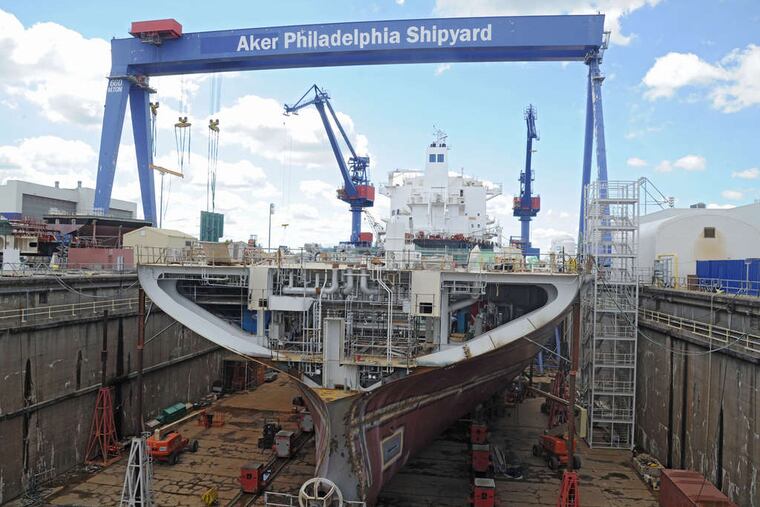Jones Act vital to keeping America safe | Opinion
Without the Jones Act, the challenge of monitoring, regulating, and overseeing foreign-controlled, foreign-crewed vessels in coastal and internal waterways would be much more difficult and costly.

As chairman of the Philadelphia Shipyard Development Corporation, I know how vital the Jones Act is when it comes to supporting the nation’s waterways.
That’s why I was disappointed to read the Cato Institute’s recent attack on the Jones Act, which appeared as an op-ed in The Inquirer: “The Jones Act is protecting US shipyards to death.” What that op-ed ignores is the vital role that the Jones Act plays in securing our homeland and overlooks the fact that the U.S. is not alone in efforts to protect its domestic waterways.
A 2007 impact scorecard developed by Carnegie Mellon concluded that the Philadelphia Shipyard had supported 7,874 direct and indirect jobs in 2006. Today, Philadelphia is home to a world-class shipyard facility, the most modern full-scale shipyard in the Jones Act market.
Philadelphia has an ISO 9000 certified union workforce that can move 25,000 tons of steel and build three large commercial sea-going ships per year. In the 15 years Philly Shipyard has been building ships, it has built nearly 50 percent of all the large commercial sea-going ships in the U.S., and the shipyard has been responsible for over $1 billion in wages paid to workers and subcontractors. None of this would have been possible without the Jones Act.
In testimony before a House Appropriations Homeland Security Subcommittee hearing, Admiral Karl Schultz, commandant of the United States Coast Guard, testified that “the Jones Act is important to the security of our nation, the merchant fleet here, and our ability to move military supplies and military outloads.” The Jones Act came into being nearly 100 years ago, to ensure that our great nation would at any time be able to maintain a sizeable fleet of U.S.-built, -owned, and -crewed commercial vessels, available for military use in national emergencies and to protect our domestic waterways. The U.S. is not alone in this strategy.
Nearly two-thirds of the maritime states of the United Nations, covering every geographic region of the world, provide some degree of governance support for their respective maritime cabotage trades that favor each nation’s domestic ships. UN member states with cabotage include China and Russia. It is easy to find fault with such restrictions, but as in the U.S. they are often grounded in national security concerns, which should outweigh any faults.
Many foreign governments also richly subsidize their commercial shipbuilders operations, but U.S. shipyards such as the Philly Shipyard must fend for themselves.
Our country’s war plans assume the availability of a sizeable U.S. commercial fleet that can supplement reserve ships. Thanks to the Jones Act, it is the U.S.-flagged tankers and container ships that make up this supplemental reserve fleet.
If the Jones Act were repealed, these vessels would either cease operation or likely be registered elsewhere, and then the Navy would have to greatly expand its organic sealift assets, costing billions of dollars. In addition, without the Jones Act, U.S. construction of large, commercial oceangoing vessels would cease, and foreign ships and mariners would likely take over critical U.S. economic infrastructure, which would create major security concerns, as our domestic waterborne commerce is critical to the U.S. auto, appliance, machinery, and railcar industries.
In the ‘91 Gulf War, our armed forces were forced to rely on foreign-flagged ships to carry cargo to the war zone. The foreign crews on 13 of those vessels mutinied, forcing those ships to abandon their military mission. Can our country really afford to take those risks? Do we really want our ability to move military supplies and outloads in the hands of foreign countries?
As noted by Loren Thompson, an expert national security writer, “the bottom line is the Jones Act provides major national security benefits that critics seldom acknowledge.” One only needs to contemplate the possibility of Chinese or Liberian tankers transporting oil in our domestic waterways, which could greatly increase the likelihood of domestic terrorism, drug trafficking, illegal immigration, and economic disruption, especially in wartime.
Without the Jones Act, the challenge of monitoring, regulating, and overseeing foreign-controlled, foreign-crewed vessels in coastal and internal waterways would be much more difficult and costly.
Manuel N. Stamatakis is chairman of the Philadelphia Shipyard Development Corporation.